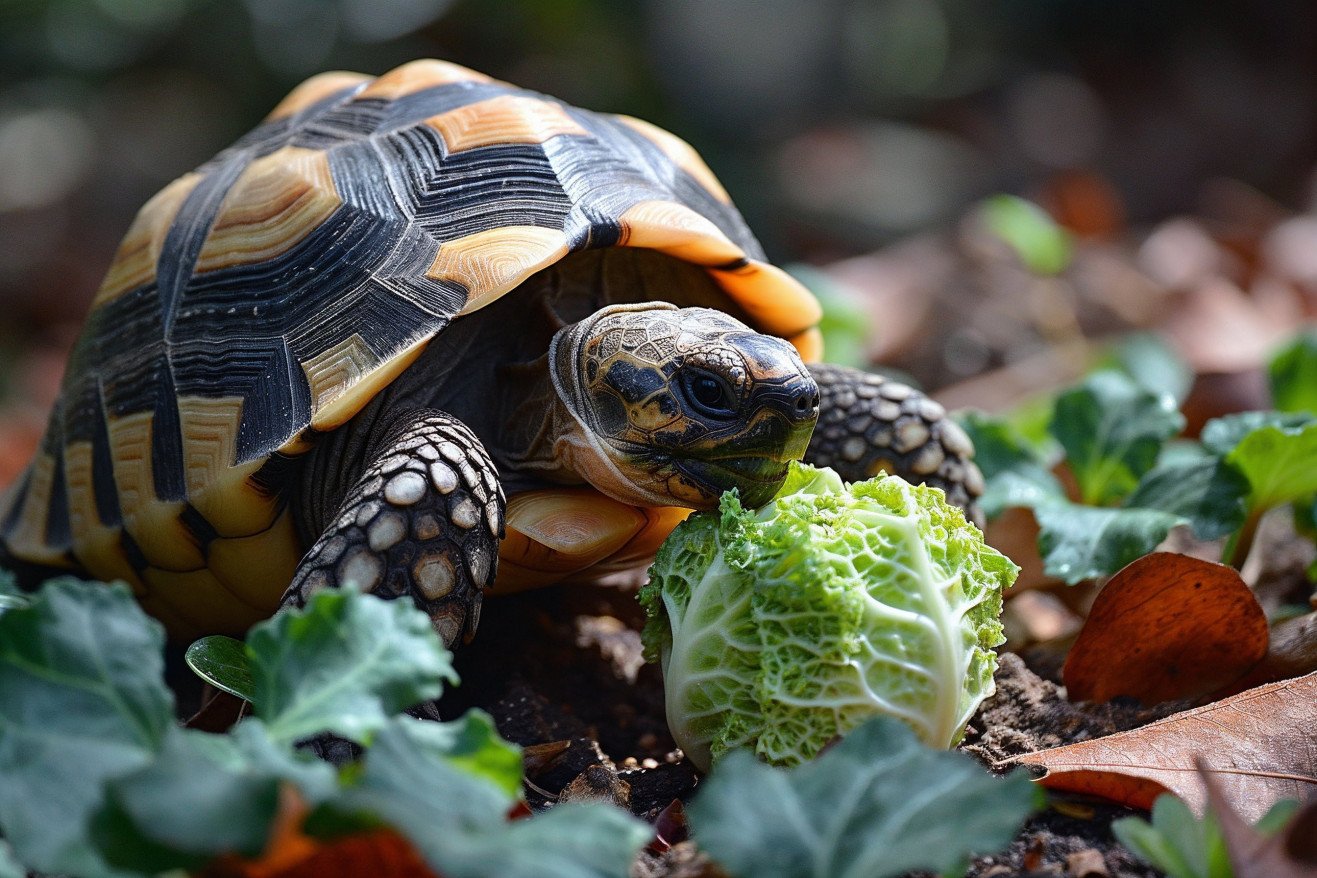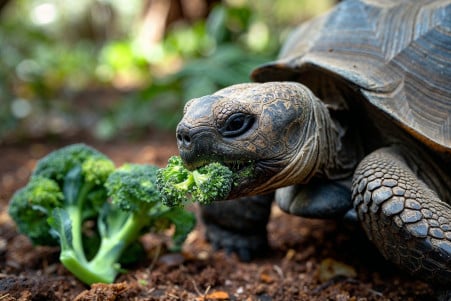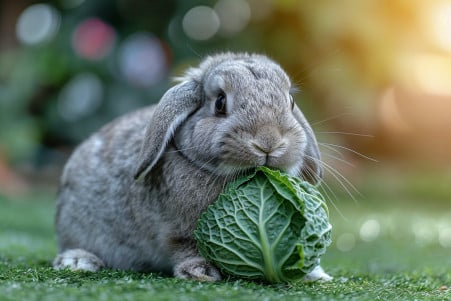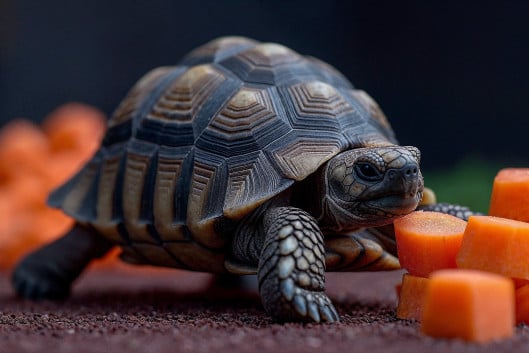Can Tortoises Eat Cabbage? A Guide to Safely Feeding Your Tortoise
31 January 2024

Cabbages are packed with important nutrients, but can you share them with your tortoise? The short answer is yes, tortoises can eat cabbage, but it should be limited. Cabbage is high in goitrogens, which can cause goiter and negatively impact the thyroid, liver, and kidneys. Instead, you should focus on other leafy greens that are safer for your pet.
This article will take a deep dive into the world of tortoise nutrition and the role that vegetables play in their diet. It will cover everything from veterinary research to reptile nutrition, including a comparison of the nutritional content of different vegetables to determine where cabbage fits in.
It will also look at the potential health risks, including the impact of goitrogens, so you can feel confident in your choices for your tortoise’s diet and health.
Can tortoises eat cabbage?
What Do Tortoises Eat?
Tortoises have a wide range of dietary needs, and those needs can vary greatly depending on the species of tortoise. The Tortoise Table explains that it’s important to make sure that you’re feeding your tortoise a diet that’s specific to their species.
In general, however, tortoises need a diet that’s high in leafy greens and vegetables to meet their nutritional needs. Leafy greens are especially important for tortoises because they provide the calcium and vitamins that are essential for the development of a tortoise’s shell and bones.
That said, not all leafy greens are created equal. Safari Veterinary Care Centers explains that you should avoid feeding your tortoise foods that contain anti-nutritional factors like oxalic acid and too much protein, which can bind to other nutrients and make them unavailable to your tortoise or cause other health problems.
The Tortoise Table also explains that while foods like cabbage are high in nutrients, they also contain goitrogens, so they should be fed to tortoises sparingly and infrequently.
In addition, tortoises need to be exposed to natural sunlight or UVB light to help them synthesize vitamin D3, which is essential for calcium absorption, according to ExoticDirect. If tortoises can’t be exposed to natural sunlight, they need to be given UVB lighting and dietary supplements to prevent health problems.
By making sure that you’re feeding your tortoise a healthy diet and exposing them to natural sunlight or UVB light, you can help ensure that they live a long, healthy life.
Different Types of Cabbage and Their Impact on Tortoises
The cabbage family is made up of many different types of cabbages, all of which have different nutritional makeups.
Nutrition and You lists several types of cabbages, including green, purple, red, and savoy cabbages, as well as bok choy and Napa cabbage.
For example, red cabbage is high in anthocyanin flavonoids, One Green Planet reports that red cabbage is notable for its high anthocyanin flavonoid content, while Souper Sage points out that green cabbage is high in vitamin K.
One of the biggest concerns with cabbage is that it contains goitrogens, which are known to interfere with thyroid function. While the impact of goitrogens on tortoises is not well understood, it’s important to make sure that cabbage is fed in moderation.
More research is needed to determine the role of goitrogens in reptile diets and how to best feed these leafy greens to tortoises. However, if their dietary needs are taken into account, cabbage can be fed to tortoises in moderation to help support their overall health and well-being.
Goitrogens and Their Impact on Tortoises
Goitrogens are defined by the Merck Veterinary Manual as substances that interfere with the normal function of the thyroid gland and cause goiter, an enlargement of the thyroid, that can be seen in a number of different animals. In animals, goitrogens can decrease the production of thyroid hormones, which in turn increases the levels of thyroid-stimulating hormone (TSH) and causes thyroid gland hyperplasia.
Understanding the impact of goitrogens on reptile health, especially tortoises, is incredibly important. A study in PMC delves into the impact of goitrogens, which are often a concern due to the consumption of cabbage in tortoise diets. While there is limited direct research on tortoises, the study’s results offer important information that can be used to inform responsible feeding.
Responsible feeding requires careful planning to control the amount of goitrogens tortoises are exposed to. This means that cabbage and other goitrogenic foods should only make up a small part of a tortoise’s diet, according to the Tortoise Table.
This can be achieved by controlling the amount and frequency of these foods, which in turn will help to reduce the risk of thyroid dysfunction and set the stage for a tortoise’s long-term health and dietary needs.
How to Make Sure Your Tortoise Has a Healthy Diet
A tortoise’s diet is one of the most important factors in its overall health. Since they are primarily herbivores, about 85% of a tortoise’s diet should be made up of vegetables, according to the experts at All Creatures Animal Hospital.
Dark leafy greens like kale, mustard, and dandelion greens are great staples. However, it’s important to rotate these staples with other vegetables like squash, carrots, and the occasional cabbage to make sure they get a variety of nutrients.
The age of the tortoise will determine some important differences in feeding schedules and portion sizes. Hatchlings need to be fed every day, while adults do best when they are fed three times a week.
The experts at Kapidolo Farms note that it’s important to make sure that the tortoise’s diet is balanced and that it changes based on the tortoise’s size and activity level. They also recommend variety and foraging to make sure that the tortoise’s nutritional needs are met.
When it comes to monitoring a tortoise’s health, it’s important to keep an eye on their shell, their energy levels, and their appetite. This may mean that you need to make changes to their diet, and the experts recommend regular vet visits.
As tortoises age, their dietary needs will change, and this may mean that their meal plan needs to be re-evaluated and adjusted. Making sure that they are getting the right nutrition and paying attention to these factors will help ensure that your tortoise is healthy and happy.
Final Thoughts on Tortoise Diet and Eating Cabbage
So, while tortoises can eat cabbage, it should be fed to them with caution because of the goitrogens it contains. We’ve stressed the importance of a varied diet that includes lots of leafy greens and other vegetables to make sure your tortoise gets all the nutrients they need. This means using goitrogenic foods in moderation so that your tortoise can get the nutrients they need while still protecting their thyroid health.
Good tortoise care goes beyond just what you feed them and includes a commitment to understanding and meeting their complex dietary needs. Regular visits to the vet can help ensure that you’re getting personalized dietary recommendations that are specific to your tortoise’s species and individual needs, which can help ensure that they live a long and healthy life.
As responsible pet owners, we want to make sure that we’re providing the same kind of variety and abundance that tortoises would have in the wild. Let’s use this information as a starting point and continue to learn more so that we can make sure that we’re always doing what’s best for the health and well-being of these amazing animals that we’ve taken into our homes.


